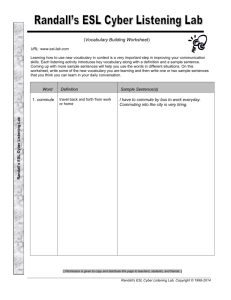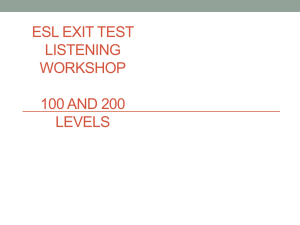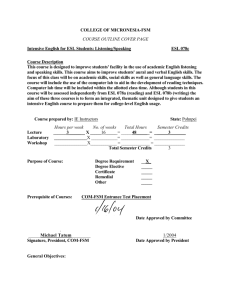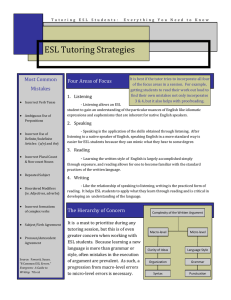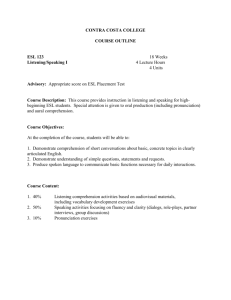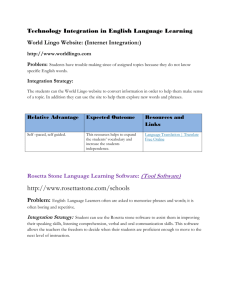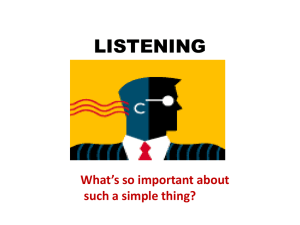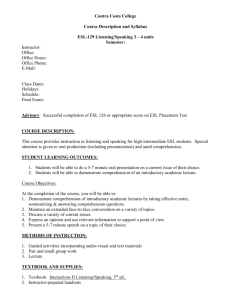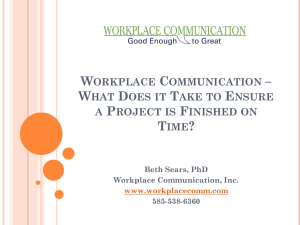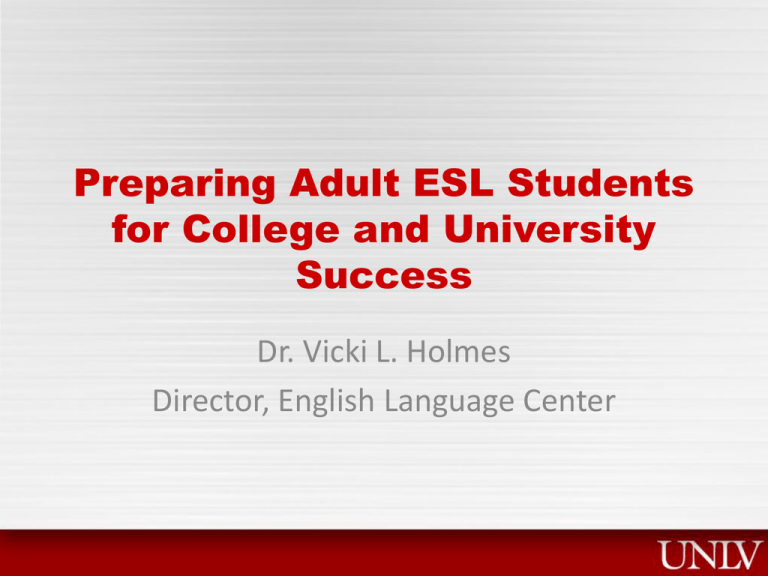
Preparing Adult ESL Students
for College and University
Success
Dr. Vicki L. Holmes
Director, English Language Center
Who are our students?
•Immigrants?
•Sojourners?
•Professionals?
•Highly educated in their native
language?
•Uneducated in native language?
•Teenagers?
•Breadwinners?
•Seniors?
What do students want?
•
•
•
•
•
•
Better job?
Respect?
Better life for their families?
Acculturation?
Education?
Own a business?
How can we help?
ENGLISH
Myths about learning English
I can do it in a few months
Risk taking
Internal motivation
Immersion
Language attitude
Native language
I can learn everything from my
books and my teacher
I am an adult; I should not
make mistakes
or
I am too old to learn English
Once I get into college, I won’t
need to learn anymore English
ESL academic students…need
to know
•
•
•
•
•
•
•
•
Reading is not a passive skill
Listening is not a passive skill
Writing is something you do all the time
Speaking/participation is expected
Team work is critical
Higher education has its own culture
You need to know the rules
Technology is part of the process
Reading is not passive
• How much will you read in college?
50 to 75 pages per course per week/ 300 pages per week
(textbook)
• How can you improve your reading comprehension?
SQ3R & 3Rs
• Should you use your dictionary while reading?
• Is learning vocabulary critical for college success?
How many words?
• 88,000 word families in English
• 2,000 high frequency words
words like because, of, am, eight, get, work
• College work requires 10,000 to 15,000 words
• Average educated native speakers know and
can use about 20,000 words
Listening is not a passive skill
• Language learning begins with listening
Krashen – input hypothesis/comprehensible input
Good listening is active
• Students must do something with what they
hear/listen with a pencil in hand
answer questions
solve problems
make diagrams
write down key words
write questions
look for main ideas
Listening Resources
http://www.esl-lab.com/
http://iteslj.org/links/ESL/Listening/
http://www.manythings.org/
What kind of writing do college
students do?
•
•
•
•
•
•
•
•
Summaries/paraphrases
Thesis driven essays – freshman comp
Timed writing – essay exams
Lab reports
Critical reviews of literature/articles/text
Case studies analyses
Project reports
Reflective writing
http://www.youtube.com/watch?v=V7pYB6W049I
What skills are needed?
Linguistic – sentence accuracy
Structure – logical organization
Critical thinking – ability to tease out an
argument
What kind of written errors do
professors least tolerate?
Global errors
1. word order (for the test after school I study)
2. Sentence structure – clauses (embedded ideas)
3. Verb tense and form – unnecessary shifts
4. Conditionals and modals
Errors professors tolerate
Local errors which do not affect meaning
1. subject-verb agreement
2. Articles
3. Word form and choice
4. Prepositions
5. Singular and plural count nouns
ESL student writing support
Writing Center
Academic Success Center
Tutors
Library classes and help desk
Office of Student Conduct
http://www.commoncraft.com/video/plagiarism
Participation is expected
• Pair and group work/student driven learning
• Team projects - business model
collaborating and task based learning
working with diversity
negotiating
compromising
communicating
Culture of higher education
•
•
•
•
•
•
•
Carnegie units
Majors – college/divisions
Advising
Terms – exam schedules
Time management
Grading
Meeting professors
Technology
Student enrollment system
Webcampus/blackboard
Emailing professors
Researching on-line
Word processing
Designing graphics/PPT
Thanks!

